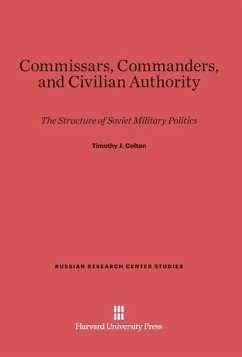For six decade the Soviet system has been immune to military rebellion and takeover, which often characterizes modernizing countries. How can we explain the stability of Soviet military politics, asks Timothy Colton in his compelling interpretation of civil-military relations in the Soviet Union.
Hitherto most western scholars have posited a basic dichotomy of interests between the Soviet army and the Communist party. They view the two institutions as conflictprone, with civilian supremacy depending primarily upon the party's control of officers through its organs within the military establishment. Colton challenges this thesis and argues that the military party organs have come to possess few of the attributes of an effective controlling device, and that the commissars and their heirs have operated as allies rather than adversaries of the military commanders. In explaining the extraordinary stability in army-party relations in terms of overlapping interests rather than controlling mechanisms, Colton offers a major case study and a new model to students of comparative military politics.
Hitherto most western scholars have posited a basic dichotomy of interests between the Soviet army and the Communist party. They view the two institutions as conflictprone, with civilian supremacy depending primarily upon the party's control of officers through its organs within the military establishment. Colton challenges this thesis and argues that the military party organs have come to possess few of the attributes of an effective controlling device, and that the commissars and their heirs have operated as allies rather than adversaries of the military commanders. In explaining the extraordinary stability in army-party relations in terms of overlapping interests rather than controlling mechanisms, Colton offers a major case study and a new model to students of comparative military politics.
A fine, scholarly book that will no doubt quickly establish itself as the standard work on the role of the Soviet military as a political actor and as an institution. It is a basic study and a clear historical review, and at the same time it presents an advanced and sophisticated analytical approach to Soviet military politics...The result is a detailed study of the Soviet military that has high comparative value for the examination of military political conduct in general. This is an advanced work.
Colton's study is excellent in terms of both content and methodology.
It has been generally assumed by Western observers that there is and has been tension in the military between the party's political officers and the military commanders... [Colton] argues the contrary thesis that the Military Party Organs for the most part are not in conflict with the regular military staff and command... Professor Colton is able to support his theses with an abundance of evidence...He not only has surveyed all the available military press and some of the party and government press but has made extensive use of the published memoirs by military commanders in World War II... This volume is well worth reading and makes an important contribution in refuting the views of many Western observers on Soviet civil-military relations.
Colton's study is excellent in terms of both content and methodology.
It has been generally assumed by Western observers that there is and has been tension in the military between the party's political officers and the military commanders... [Colton] argues the contrary thesis that the Military Party Organs for the most part are not in conflict with the regular military staff and command... Professor Colton is able to support his theses with an abundance of evidence...He not only has surveyed all the available military press and some of the party and government press but has made extensive use of the published memoirs by military commanders in World War II... This volume is well worth reading and makes an important contribution in refuting the views of many Western observers on Soviet civil-military relations.








